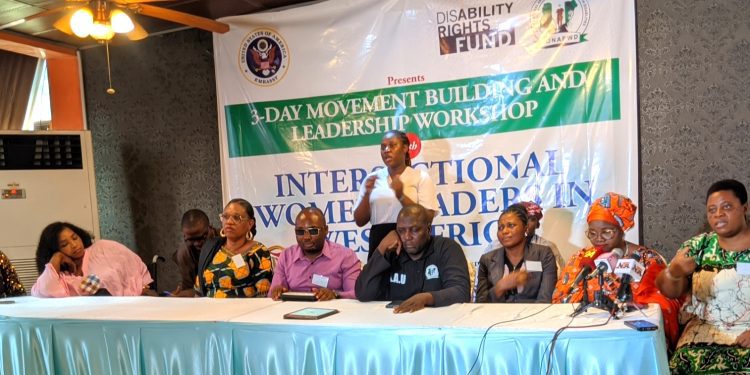The National President of the Joint National Association of Persons With Disabilities, Mr Abdullahi Usman, has called for renewed vigour in building capacity for Women with Disabilities (WWDs) in West Africa.
He made the call in Abuja at the ongoing 3-Day Movement Building and Leadership Workshop for Women with Disabilities with Intersectional Women Leaders in West Africa.
According to Mr Abdullahi, the quest for women to speak for themselves will be a utopian quest without inclusive education.
Addressing journalists at the event, the West Africa Program Manager for Disability Rights Fund, Mr Theophilus Adaudu said women with disabilities who belong to the extremely vulnerable groups continue to face exclusion from education and risks such as sexual violence because they are seen as powerless. Hence, the need to adequately equip them to know their rights, demand for those rights and defend them.
“Women with disabilities in developing countries are effectively unseen and unheard. That is why we are working with our development partners to ensure that the narrative is changed for an inclusive society,” he added.
Data Collection
Sharing insight on the bottlenecks on full implementation of policies on disability issues in the Economic Community of West African States (ECOWAS) during a panel discussion, Ms. Abimbola Olelowu, ECOWAS representative maintained that, there is a need to invest in data collection.
“For me, data collection is a big issue for us at the ECOWAS region to push for the implementation of policies surrounding Persons With Disabilities. Is there any data at all? Even if they are available, they are not disaggregated by gender size.
“The available data at the ECOWAS region are not good. This made it difficult for us to push for policies around disability. I think for us to be able to actualise the rights of women with disabilities, we need to invest heavily in data collection as disaggregated.
Economic Empowerment and Inclusive Education
During the discussion, the Gender Chairperson of the Ghana Federation of Disability Organisations (GFD), Ms. Martha Kofi, said there must be a concerted effort to empower WWDs and also towards inclusive education.
“Women are not properly regarded when it comes to interventions or initiatives that can efficiently position them. Regarding access to inclusive education, do we have teachers or professionals who are well-informed about different categories of disabilities? In as much as we preach intervention for women, people with disabilities left behind in the academic arena.
“They are also left behind in capacity building. How will they be able to represent themselves let alone speak for themselves if they lack capacity? We are yet to have women who are particularly serious in the decision making process.”
She also buttressed that “we really need to create awareness, especially for women with disabilities, for them to know what their rights are and how to represent themselves and advocate. I am passionate about youths with disabilities. Have we been able to carry our children with us? Have we given them the right words? If we are to do this, must it be in English Language? Why can’t we look into a proper context in which people can express themselves?
“I believe education is not about English. English is just an elevated language. We have local languages in which people can express themselves. So, I believe that with strategic awareness in the academic community and in the general public, we will achieve a lot.”
New Mindset
Speaking with our correspondent on how factors responsible for discrimination against women with disabilities have been tamed in Ghana, Ms Martha Kofi said alliance and capacity building played significant roles.
“Just like other African countries, our people in Ghana have these cultural beliefs, superstitions and religious perspectives that PWDS are those who offended the gods and must be punished. Therefore, people tend to look down on them and think they can not be useful.
“On the contrary, people with disabilities are those affected by life’s stresses, bash, traumatic childhood experiences, delayed pregnancy, certain medication and some conditions that you and I can not really ascertain.
“So what we did at the Ghana Federation Disability Organisations was that we changed the mindset of people and reshaped their perspectives.
“Also, we gathered people with those conditions and brought out the best in them to prove to the society that when people are living with disabilities, it does not mean they can not be useful and resourceful.”

